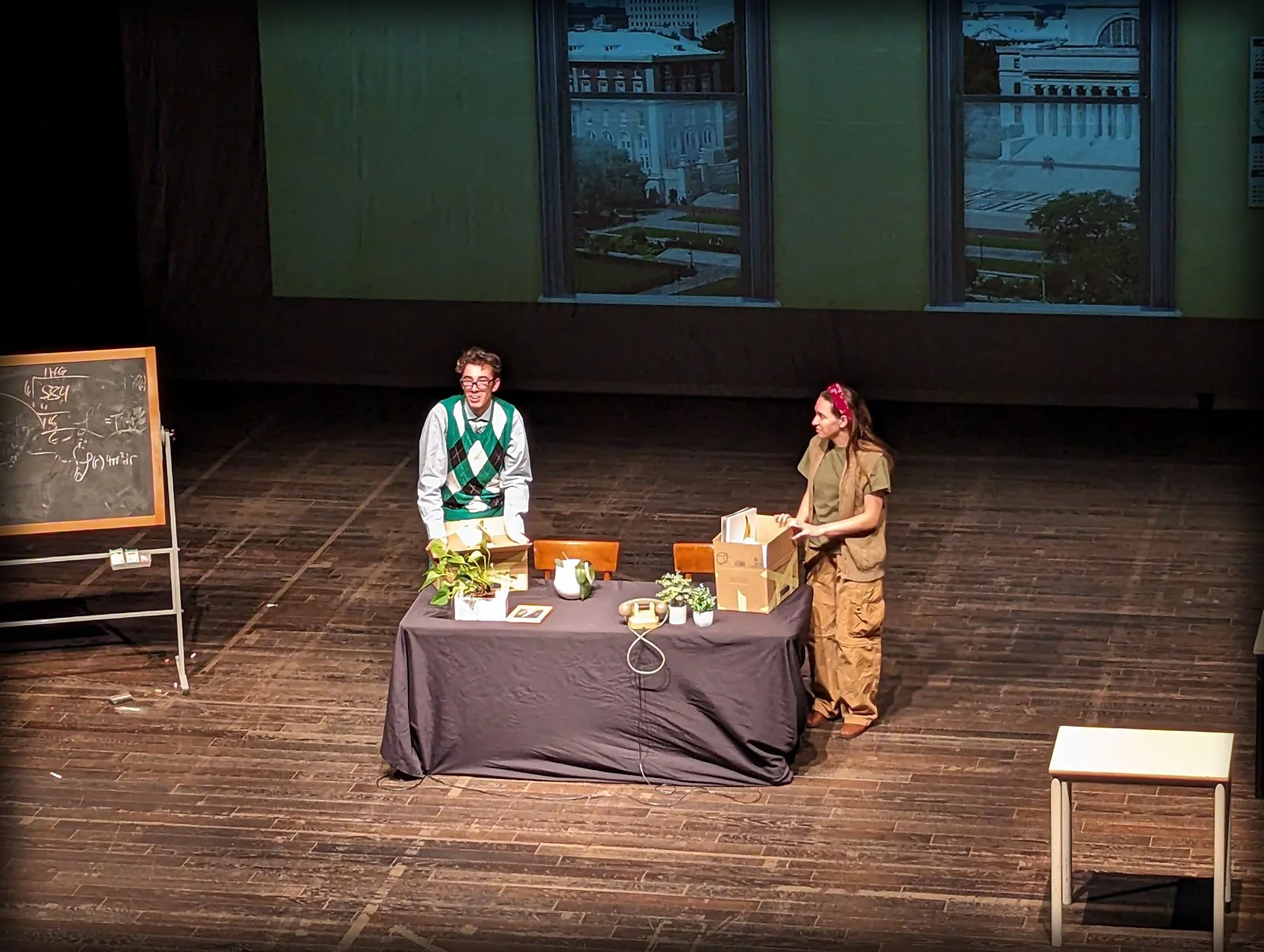Caltech Students Take the International Stage at Science Theater Festival in Italy
BY JULIA EHLERT
Gutierrez and Ware performing at the Teatro della Meraviglia festival in Trento.
Third-year undergraduate Michael Gutierrez and sixth-year graduate student Skyler Ware have a lot in common. Both are dedicated scientists—in astrophysics and chemistry, respectively—passionate journalists, and Caltech theater veterans. And in November 2023, both had an opportunity unlike any other: to co-star in a play at Teatro della Meraviglia, or Theater of Wonder, a science theater festival in Trento, Italy.
Headed by Theater Arts at Caltech (TACIT) director Brian Brophy, the two-person show, Another Revolution, follows two graduate students at Columbia University in 1968. A physicist and an ecologist forced to share a lab, the characters navigate interpersonal differences, research struggles, and political tensions in a tumultuous—and strikingly familiar—era. After a three-night run in November to a packed Beckman Institute Auditorium, the cast and crew crossed the Atlantic for a final show on November 24 at the SanbàPolis Theatre in Trento.
“It was an incredible opportunity to go represent Caltech and the United States at this theater festival,” says Ware, who played activist and botanist, Kat. “It’s amazing to be trusted to do this as a relatively inexperienced performer and to have the support and guidance and network to do it, especially at a technical school. It’s just so far outside the realm of what I thought would happen in the last year of my PhD.”
Gutierrez, who played nerdy astrophysicist Henry, has a different perspective: “I always say nothing surprises me anymore. One of the things I love about Caltech is that it’s such a small school that all kinds of weird and wonderful opportunities pop up. You never know what’s going to happen, and, I mean, that’s what I’m here for. If you’re dedicated and passionate, opportunities present themselves.”
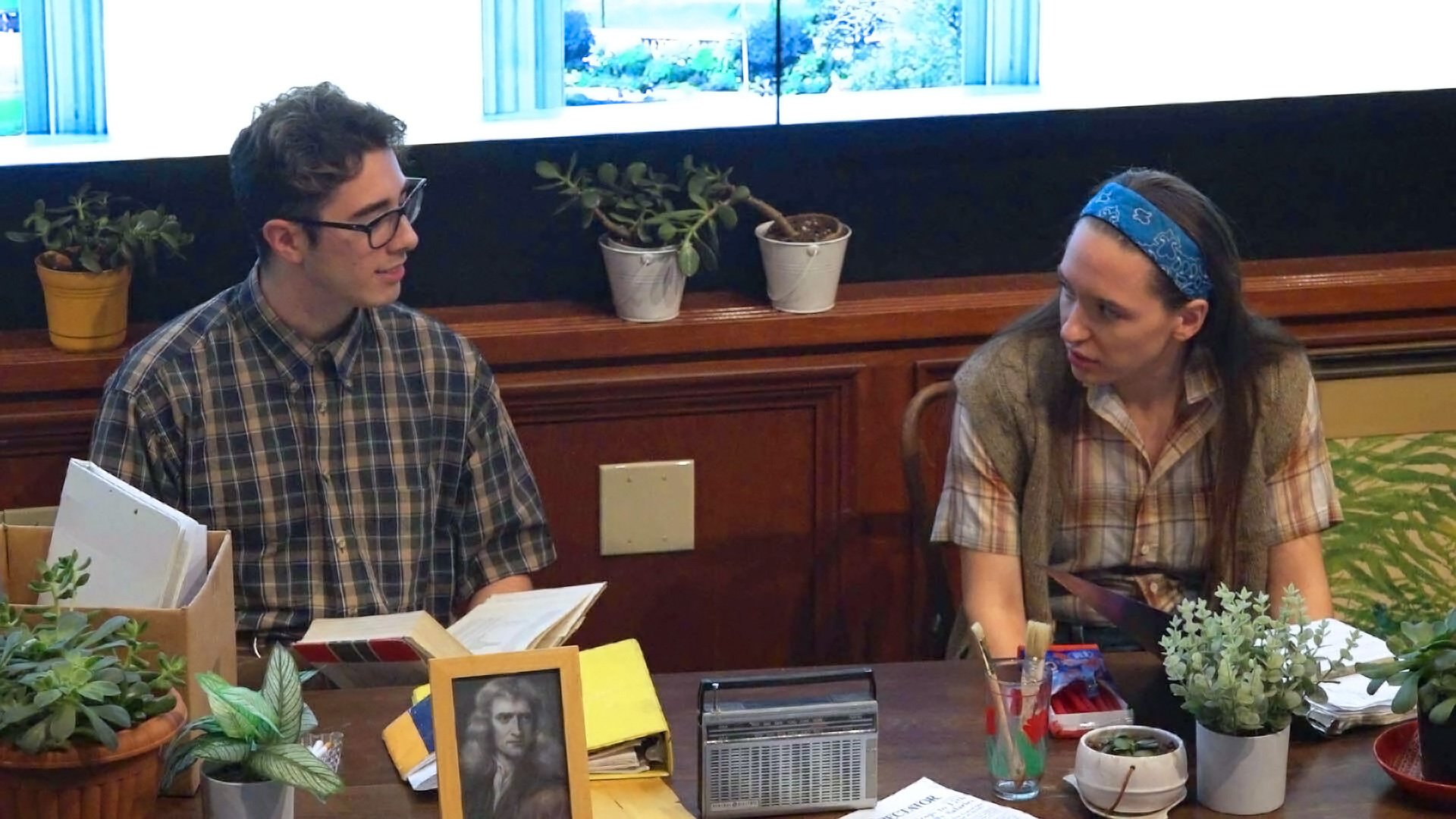
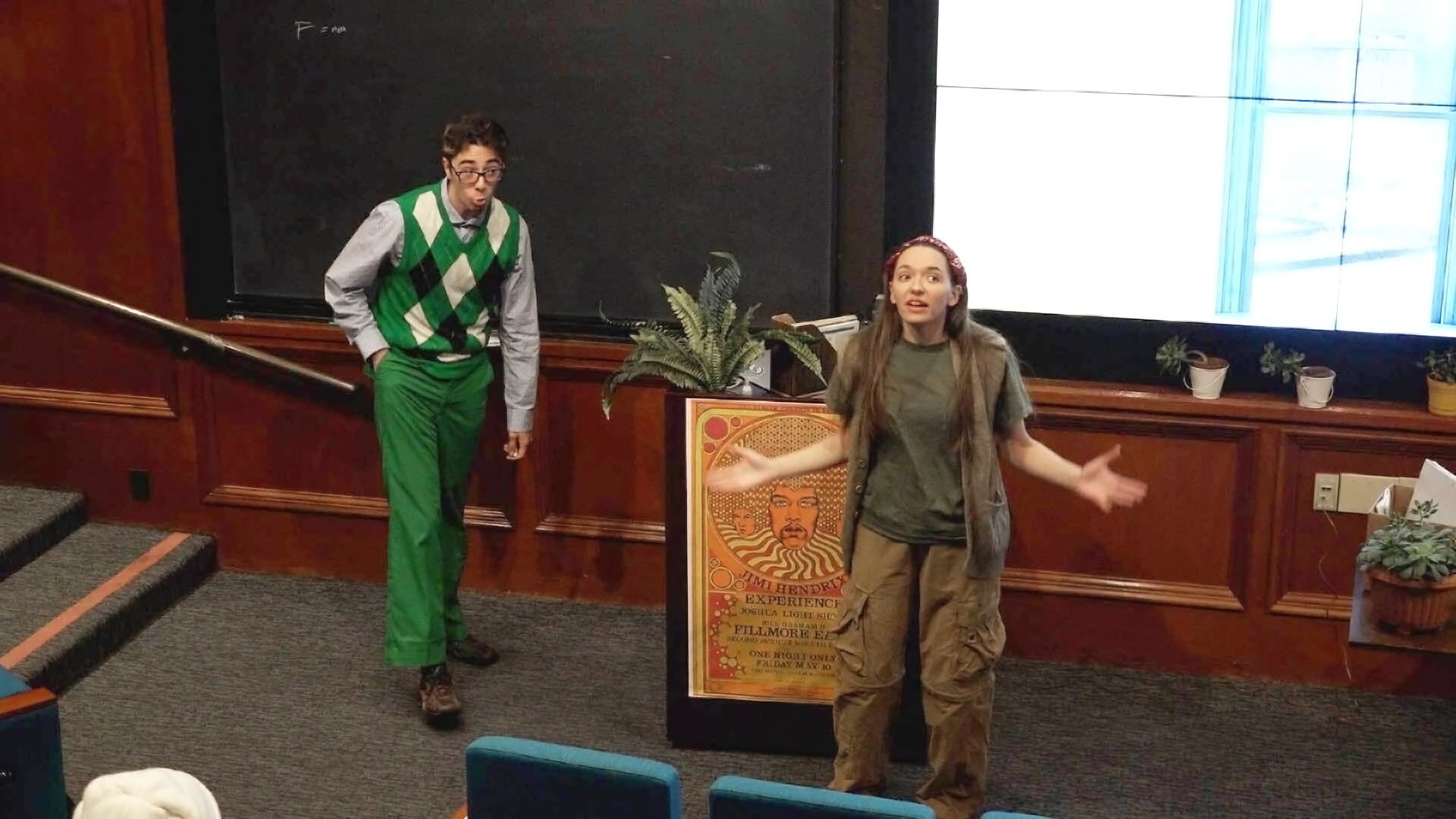

Similar serendipities characterize the story of how Another Revolution made it from script to the Italian stage. Recent alumnus Jake Mattinson (BS ’19), a quantum engineer at Microsoft and science dramaturg, was the catalyst for the Caltech–Trento connection.
Mattinson has remained involved in TACIT since his first year at Caltech. In 2018, he was a member of the play-reading committee for Mach 33, Caltech’s annual festival for new science-driven plays, when the script for Another Revolution was submitted to the festival. Though it didn’t make the cut for Mach 33, Mattinson held on to the show.
During his senior year in 2019, Mattinson won the Caltech Y’s Studenski Award, which provides a stipend for undergraduates who reach a crossroads in life and would benefit from a period of self-discovery. Hoping to learn more about how he could integrate science and theater in his career, he used the award to travel to Trento, Italy, to learn about Teatro della Meraviglia.
“There are only a handful of people working at the intersection of science and theater,” says Mattinson. “But the example that I think is one of the cleanest, the most dedicated to the craft, is this festival in Trento.”
In Italy, Mattinson met festival director, former physicist Andrea Brunello, a teaching affiliate at University of Trento who also runs multiple science theater projects (including one called, coincidentally, Jet Propulsion Theatre). Mattinson got a behind-the-scenes look at the festival and gained a new science communication mentor in Brunello. After the trip, he suggested an official collaboration between TACIT and the festival, and connected Brophy and Brunello.
Their first project together, The Earth Made by People: When is the Anthropocene?, consisted of four mini plays co-written by University of Trento and Caltech students including Mattinson and Gutierrez. The plays were performed at Caltech and Teatro della Meraviglia in 2022 with site-specific casts.
In 2023, TACIT was invited to submit a science play to the festival, so Mattinson recommended Another Revolution since its small cast would be easy to transport. Brophy recruited Ware and Gutierrez for the roles, and they drew upon contributions from Caltech theater benefactors, alumnus José Helú (BS ’79) and his wife, Katie, to enable the show’s trip to Italy.
“I was at TACIT before it was called TACIT under the direction of Shirley Marneus [the late founding director of the program],” says Helú. “Besides being a lot of fun, being in the shows was extremely therapeutic. Shirley made it a welcoming home to all who wanted to participate.”
“When I was able to give back to Caltech, the theater program was clearly one of the ways I wanted to do so. It's vital, sometimes literally so, that students have an active creative outlet to help them deal with the pressures of the academic focus they all face. It helps keep the social environment sane, and that, in turn, helps nurture the science that the students are helping to move forward.”
On the trip to Italy, Ware, Gutierrez, Mattinson, and Brophy were joined by Another Revolution playwright Jacqueline Bircher and stage manager Sam Engle, who is Ware’s husband. In addition to rehearsing, the group spent its time enjoying Italian food, hiking the waterfall-laden landscape surrounding Trento, and taking a day trip to Venice.
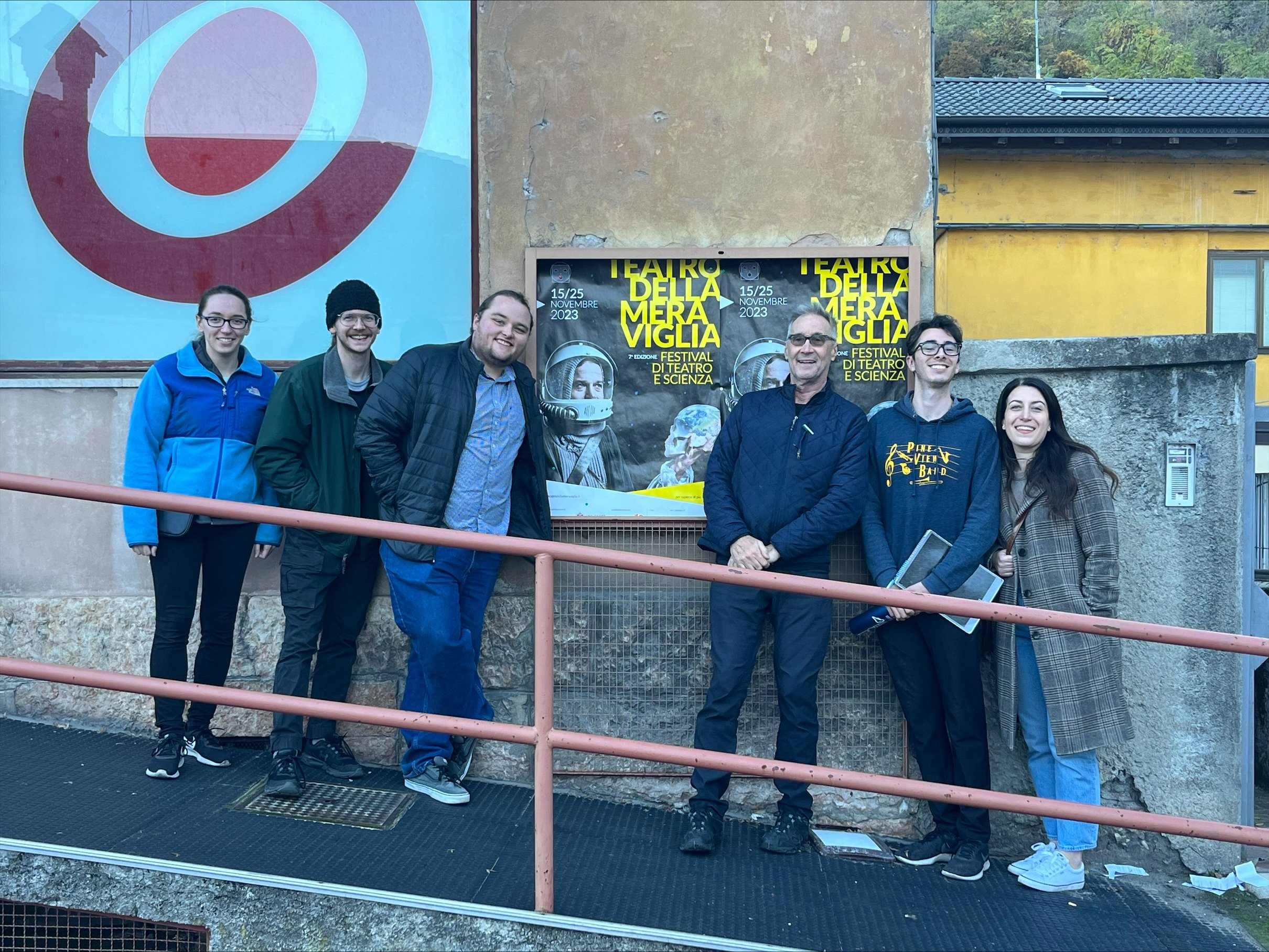
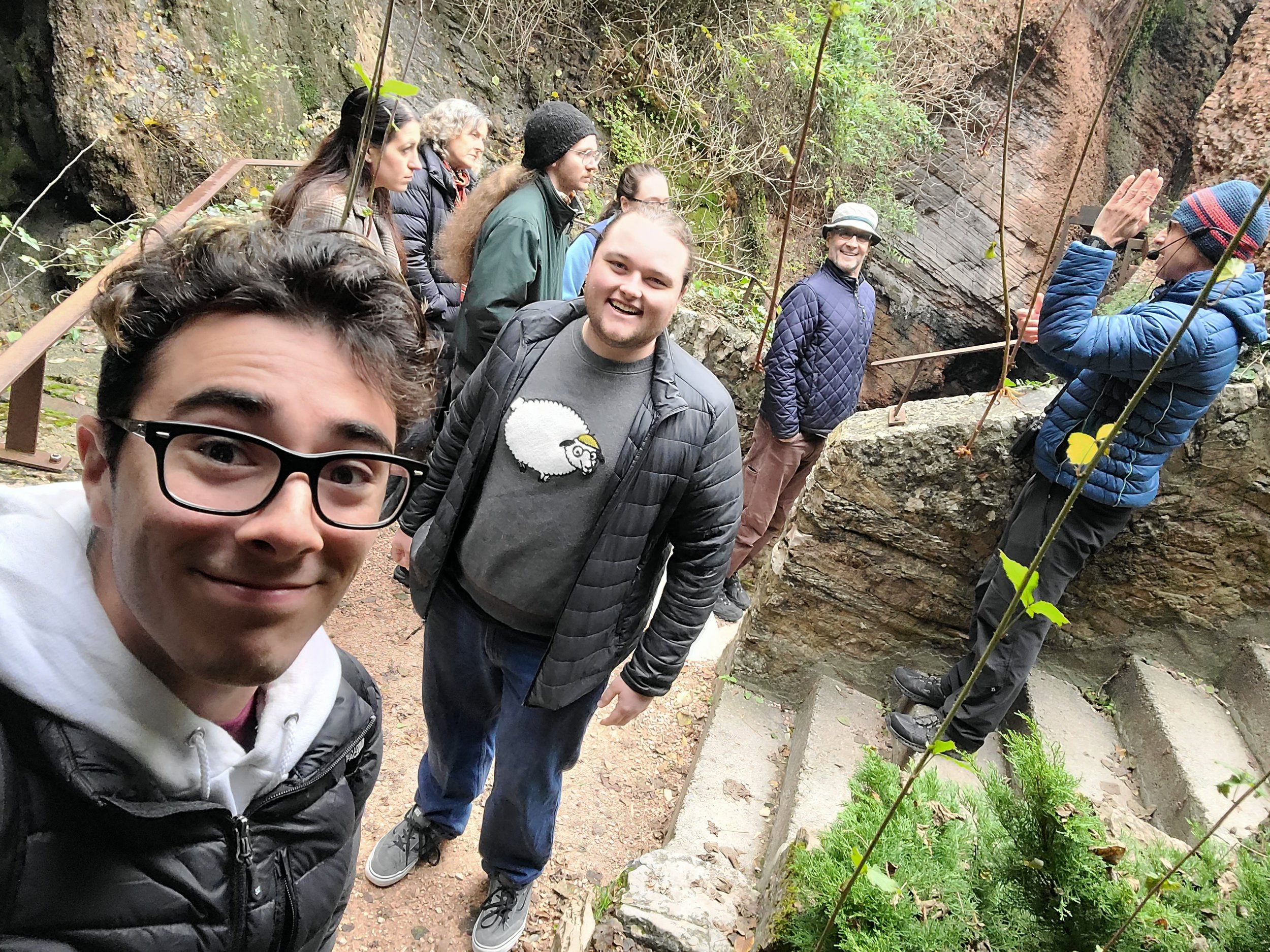
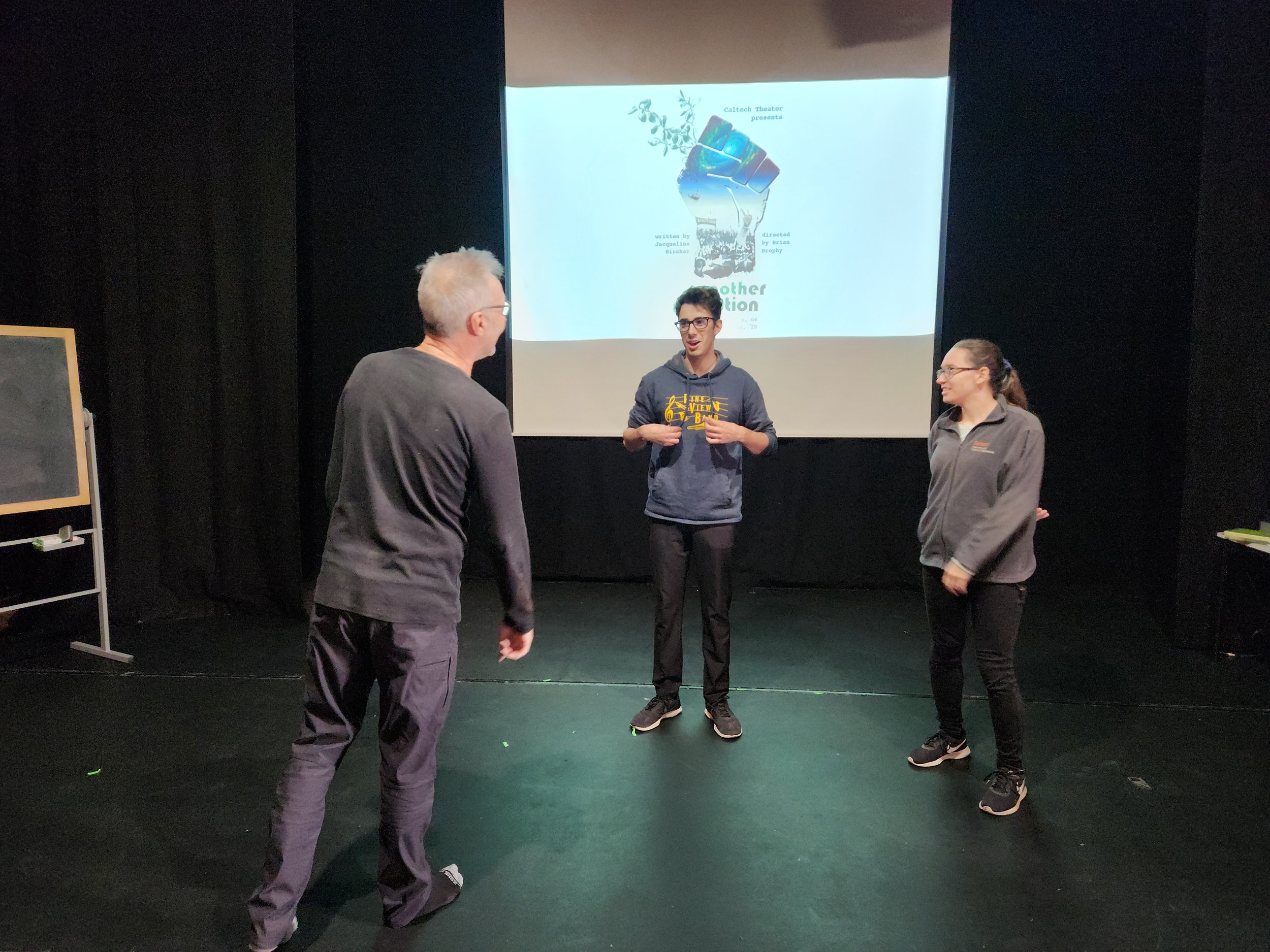
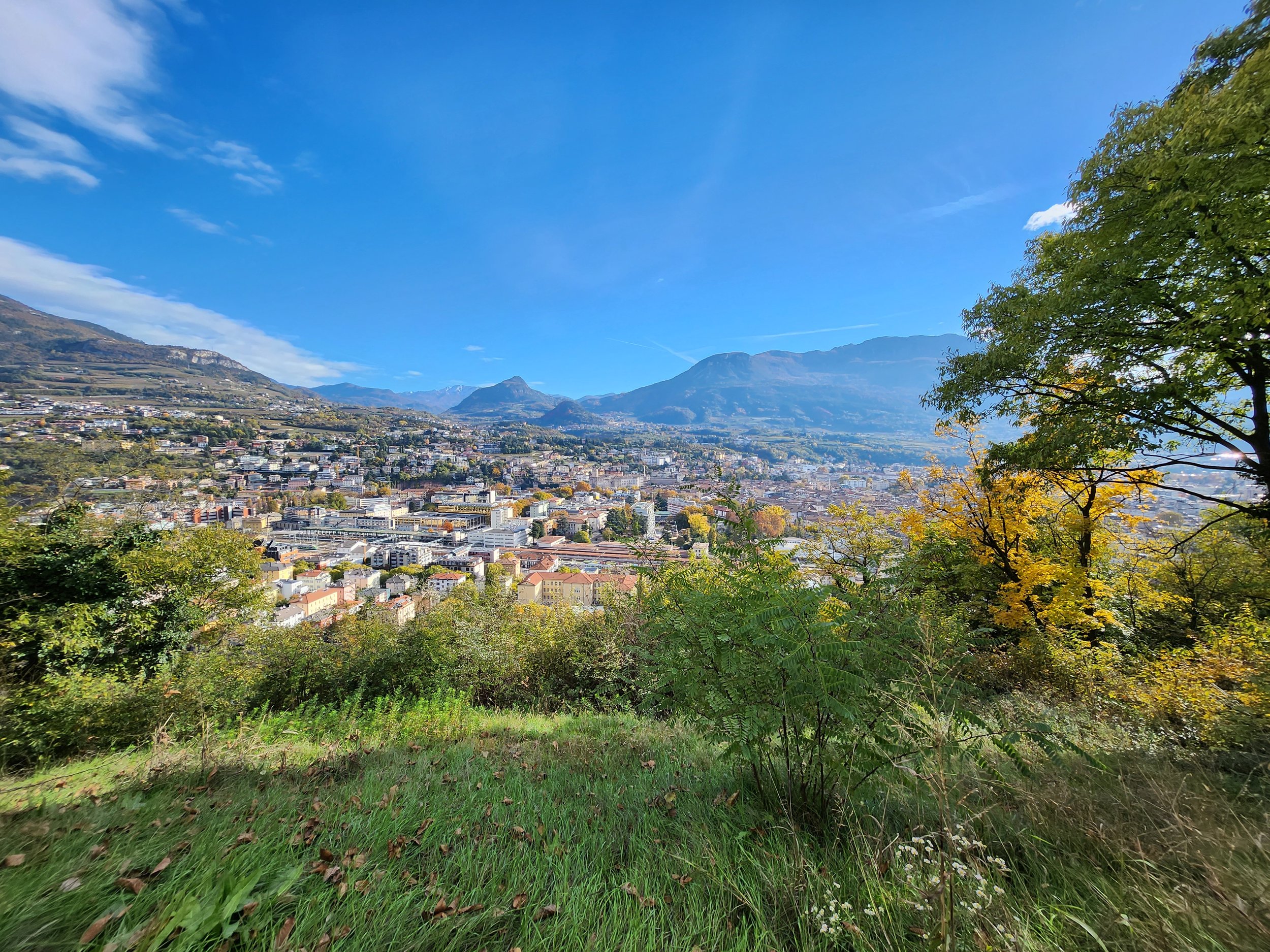
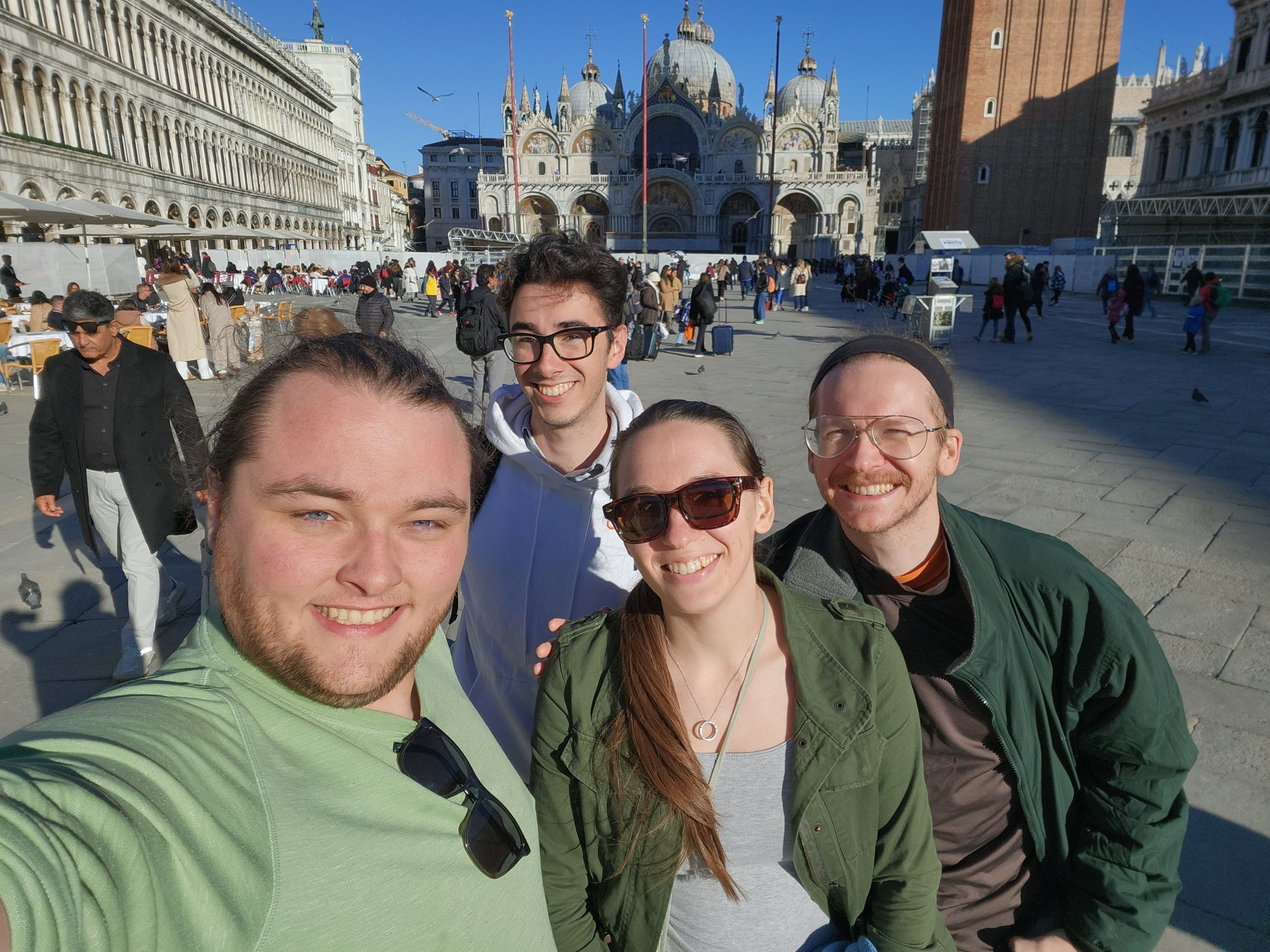
The Caltech group also attended other performances at Teatro della Meraviglia, though only Mattinson was familiar enough with Italian to understand them. Out of nine productions performed during the festival, Another Revolution was the only show in English.
“It was interesting performing for an Italian audience,” says Gutierrez. “We had Italian subtitles scrolling across the top of the projector screen during the performance, and it was very interesting to see what they reacted to and what they laughed at.”
“It's a very America-centric play,” adds Ware. “The context for the Vietnam war and the draft and everything that was going on in 1968 wasn't there for the Italian audience to the same extent that it was for the Caltech audience. But I think a lot of other cultural things were more understandable to them, like the music from the era.”
Despite language and cultural barriers, the show resonated with audiences and actors alike in both countries, as it reflected global events in the present. Ware and Gutierrez say the show’s themes of war and movements for social justice felt close to home.
“The main throughline of the play is about all the turmoil at Columbia University; students are getting expelled for protesting,” says Gutierrez. “I distinctly remember the night of one of our performances, somebody shared with me an article about MIT, from that same day; there were a bunch of student protests about the conflict in the Middle East and the MIT administration had gone around to the student protestors and threatened them with suspension.”
Ware says she connected with her character’s experience facing sexism as a female scientist.
“Obviously the challenges now are different than they were in 1968, and yet in many ways, they're the same. The show gave a voice to the parallels between the struggles that women in STEM face both then and now.”
“Jacqueline, the playwright, told us that it's a play about growing up, coming of age in a time and environment where the world feels like it's constantly falling apart,” says Gutierrez. “Everything's on fire.”
Gutierrez says he relates to that feeling and his character’s response to it: “My favorite line in the show is, ‘I don't know how to make myself care about everything. There's just too much, and it's too exhausting, and I have too much work to do.’”
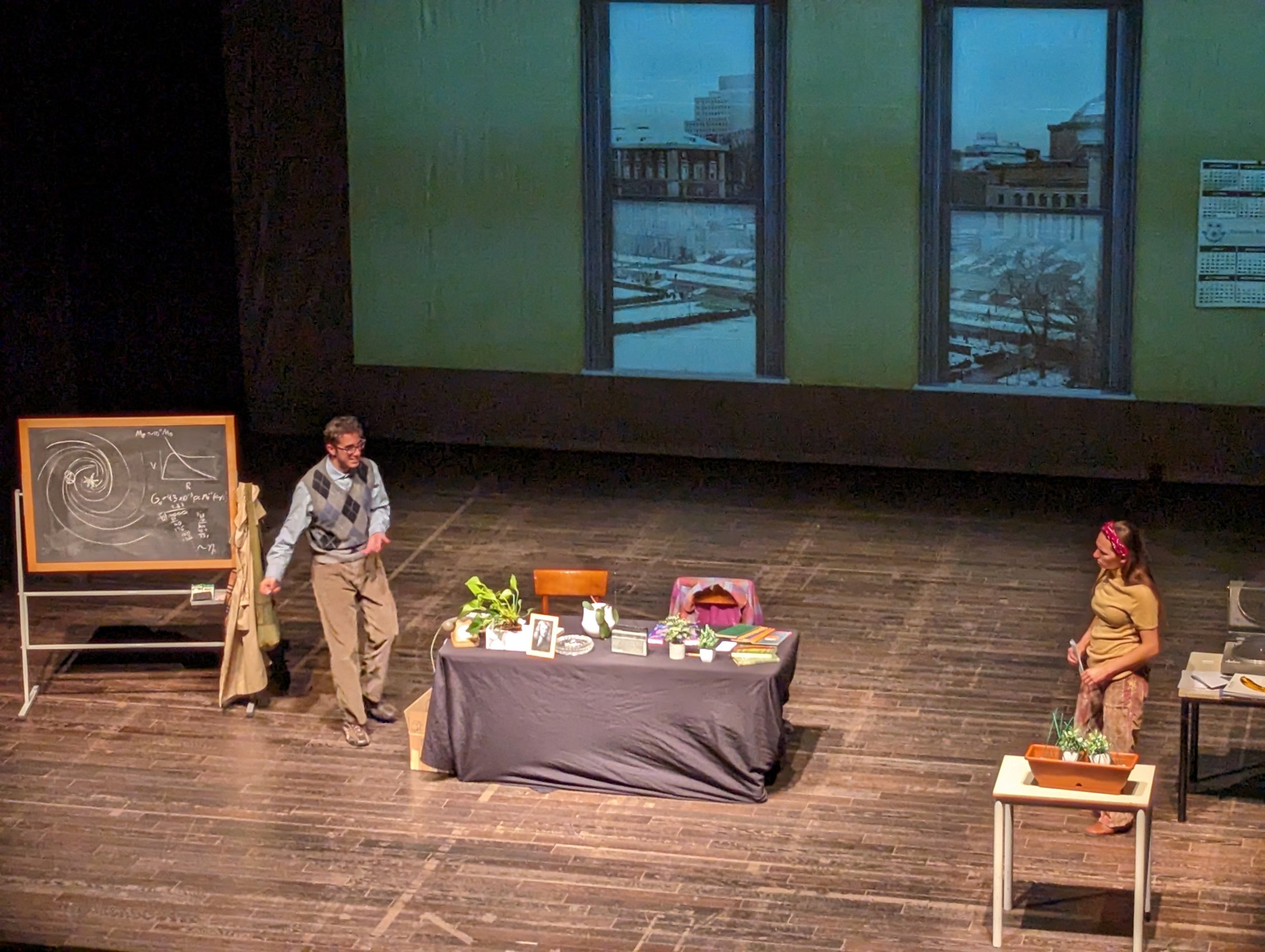
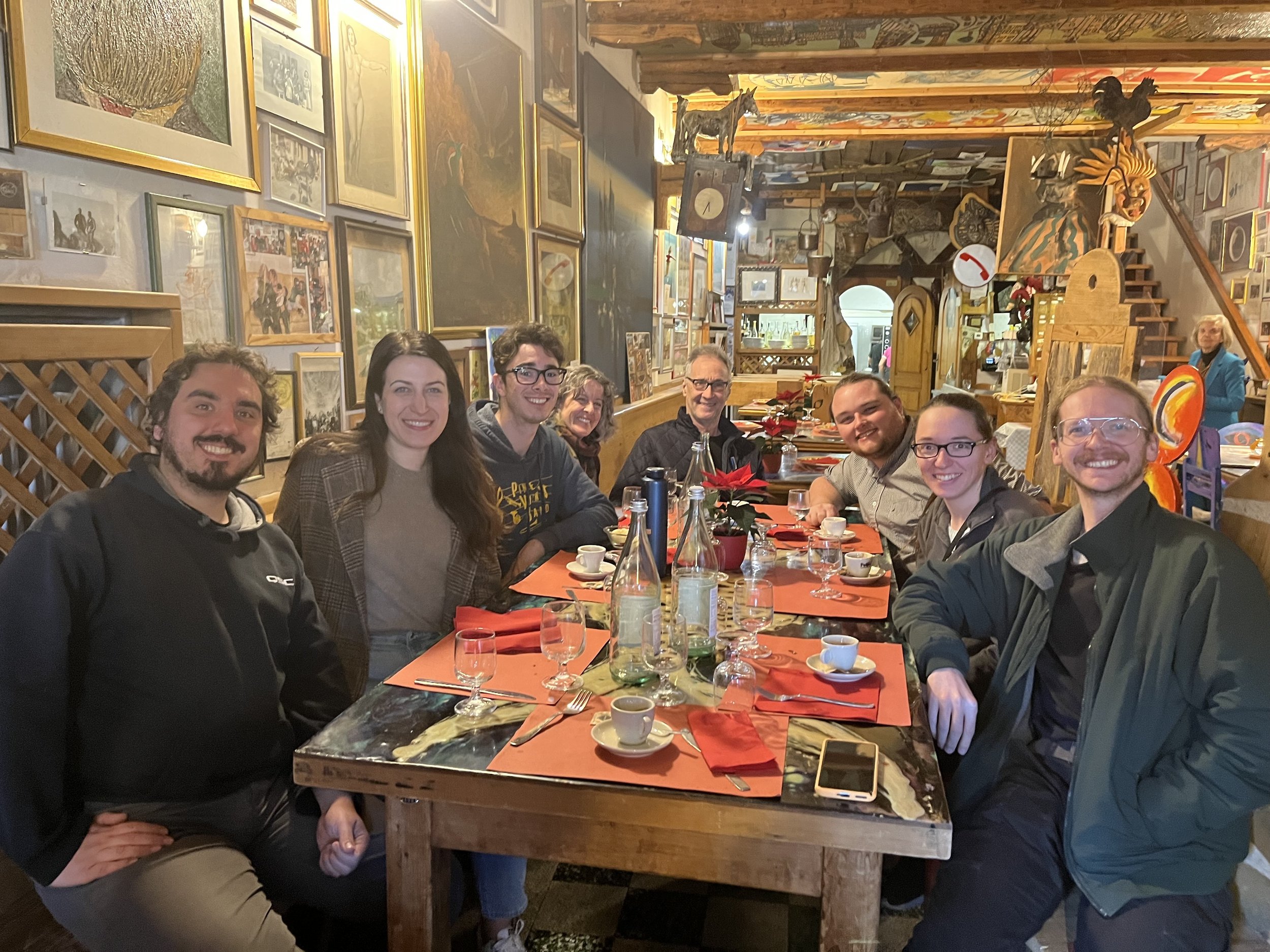
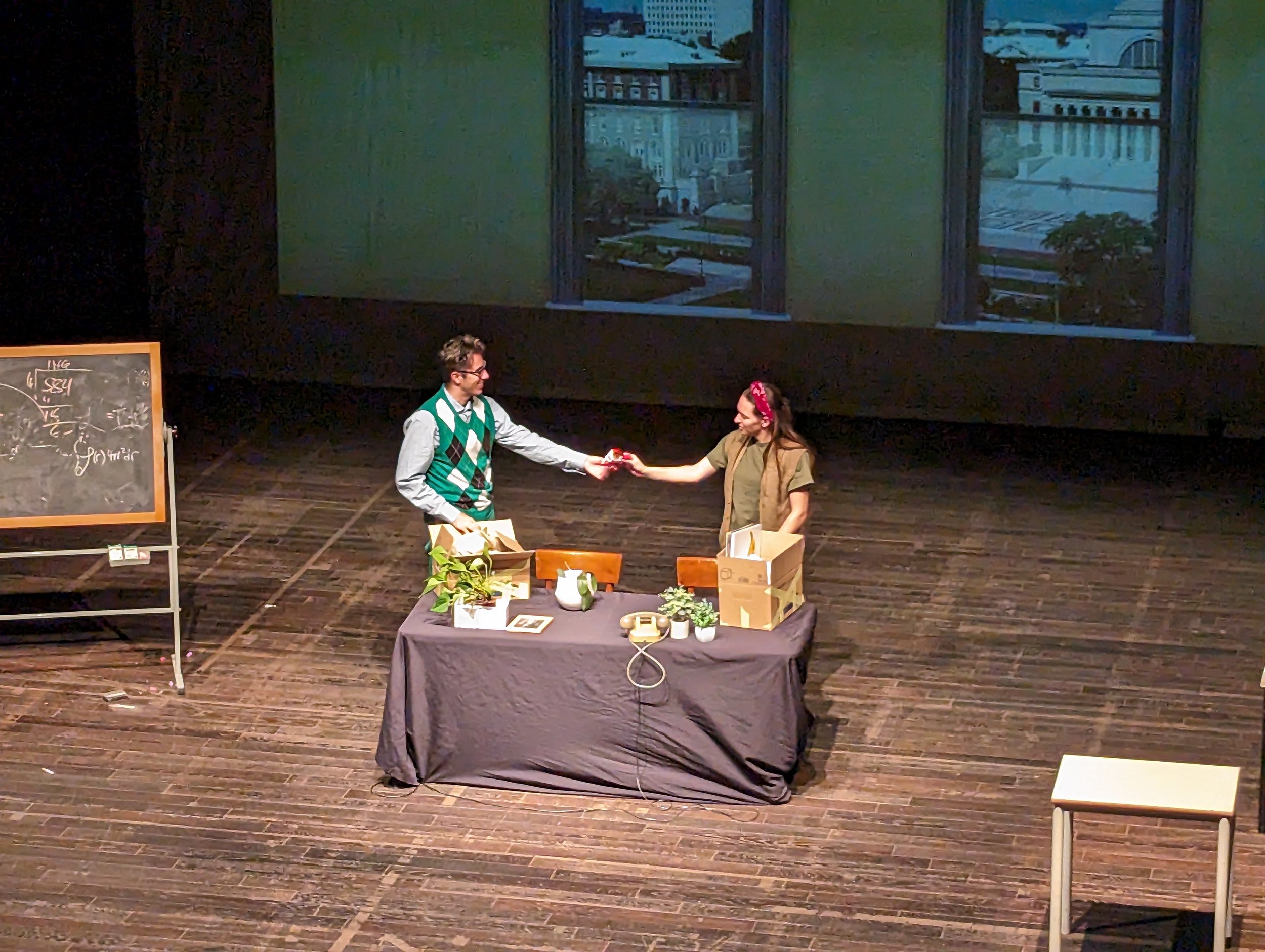
Beyond resonating with the play, Ware, Gutierrez, and Mattinson also connected over their shared love for theater, writing, and science storytelling.
“Skyler and I had kind of been on parallel tracks of TACIT activities before this show,” says Gutierrez. “We’d both done productions with Brian, and we’d both done his class, Storytelling for Scientists, but at different times.”
“This is where the paths converged,” says Ware.
“Our orbits intersected for a time,” adds Gutierrez, recasting a line from the play.
“Working on this show allowed me to get out of my head and out of the constant focus on lab work and papers,” says Ware, who was completing her doctoral thesis while rehearsing for the play. “It makes you a better scientist overall when you can free up that part of your brain to do some creative processing in the background and start thinking about things in a different way.”
Ware defended her thesis on December 13 and plans to work as a science journalist. Gutierrez serves as editor in chief of Caltech’s student newspaper, The California Tech, and says he plans to focus on balancing “way too many commitments” in the future.
Mattinson hopes to eventually pursue a career that combines science storytelling, education, and theater.
“I believe that theater has a specific humanity to it that makes it an incredibly good platform to actually convince people that scientists are humans, that they care about what they’re doing, and that science is a thing you can trust,” says Mattinson.
“I had so much ability to get involved at Caltech, which meant that it was really easy for me to do a little bit of everything behind the scenes and get an overall feeling of what theater is and what we can do with it. The ability to access these resources freely is so … ‘hashtag So Caltech.’”
Gutierrez echoes the sentiment: “This experience feels peak Caltech to me. I’m incredibly grateful to be here and to have the opportunity to have these opportunities fall into my lap.”

